Originally published in Tri-state Oil Programs Oiled Wildlife Log Volume 5.
To subscribe to Tri-State’s Oiled Wildlife Log, please email oilprograms@tristatebird.org
by Andrew Judson, Maryland Zoo Commissary Keeper & Tri-State Paraprofessional
Hi there! My name is Andrew Judson and I am currently a keeper in the Commissary Department at the Maryland Zoo, writing from the Zoo as an oil spill response partner with Tri-State Bird Rescue & Research, Inc.
Tri-State runs a Paraprofessional Partnership Program which, in brief, is an arrangement between Tri-State and several regional Association of Zoos and Aquariums (AZA)-accredited institutions to provide additional skilled staffing support during oiled wildlife responses. Many zoo professionals are comfortable with and experienced in handling wild animals. They already possess a skillset that is useful in a spill situation. That’s not to say that we don’t require any training; everyone is HAZWOPER certified and does an on-site orientation at the Campbell Building to be considered ready to help the oil team with a spill response. Through a grant arrangement with UC Davis and the Alaska SeaLife Center, AZA offers HAZWOPER training periodically to selected zoo professionals. In this area, Tri-State is able to call on staff from Maryland Zoo, National Aquarium, and Philadelphia Zoo. I was lucky enough to be selected as one of Maryland Zoo’s representatives to become HAZWOPER certified in 2019.
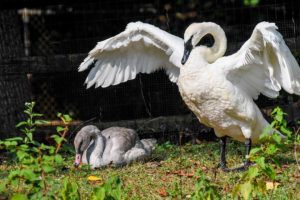
At that time, I was deeply involved in the Zoo’s Trumpeter swan breeding program, which is part of the AZA Species Survival Plan. After frequently capturing and handling full-grown, aggressive swans, as well as their more fragile cygnets, I felt pretty confident that I could help handle any kind of oiled bird.
For a long time after I got certified and completed Campbell Building Orientation, the partner network remained un-activated due to lack of need (and, of course, a global pandemic). I responded to every drill notification training and had a nice resume-building certification as my role at the Zoo evolved over the years. Little did I know that the summer of 2021 would be a career-altering, and indeed life-changing, wild ride!
I was activated to assist with a spill in mid-July. When I arrived on-site at the Campbell Building, I learned that this spill was the first time the Paraprofessional Partners were ever activated, not just since I had gotten certified! In a way, I got to be the test subject for both Tri-State and my team at the Zoo. The Maryland Zoo had sent staff to wildlife crisis responses across the globe before, but not recently for this kind of response. My role as a Commissary Keeper and the flexibility of both my managers and teammates allowed me to respond to the activation and be available for long stretches of time. I owe countless thank-yous to them for picking up my share of the load on the home front. This response was a smaller one, and it was a great opportunity to learn the ins and outs of a response while the total number of patients remained low. I participated in my first few wash processes, and this hands-on experience proved to be quite useful later down the road. The response for the mid-July spill wrapped up after four days, and I went back to the Zoo with a new set of skills.
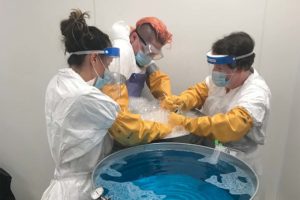
A mere few weeks later, Tri-State reached out again to the Paraprofessional Partners network; this time, anyone available to respond to Tri-State’s request would be on a two-week rotation at the Avian Conservation Center in South Carolina. I was able to respond and was selected to join Carly, Tri-State’s Operations Manager and head down to South Carolina to help staff the response center. One long road trip later, we got to South Carolina and provided rehabilitative care for an oiled Laughing gull that was later successfully released. Several days into the response, it became known that a colony of tern chicks had been impacted by the release and more than two people would needed to provide professional rehabilitative care. Two of my HAZWOPER- trained colleagues at the Zoo, Jess Phillips (Penguin Coast Area Manager) and Jen Sohl (Hospital and Conservation Programs Manager), along with Dr. Cristin Kelley, Tri-State wildlife veterinarian, were activated. They joined Carly and me in South Carolina shortly after the group of tern chicks arrived. During this response, I got a better understanding of what a large number of patients can look like and how to manage washing them. If I do say so, I got quite good at resetting the washroom and turning over the wash lines so that we could accommodate multiple washes in a day and help as many birds as possible. It ended up being ten long days of living and breathing oiled wildlife response. This trip in particular was such an eye- opening experience for how every person working on a response can’t help but go all-in on the effort. I was exhausted but so proud of what we accomplished and excited that I had gotten to learn so much and fill so many roles on the response team. It was here that I got to start doing more as a member of the wash team, and I was touched that I was trusted with the responsibility of washing the oil off a bird. At the end of our ten days, we headed back home for what ended up being a shorter break than anyone thought.
Toward the end of August, Tri-State was activated again for a spill a bit closer to home, and the response operated from the Campbell Building. I responded for the third time, but this spill was an all-hands-on-deck situation, so the Zoo also sent Jen Sohl and Jen Kottyan (Avian Collection and Conservation Manager). Other members of the Paraprofessional Partners network also responded, and Tri-State had a team from the Oiled Wildlife Care Network on the west coast flown in to help. The sheer number of oiled geese recovered in the field required a huge number of trained personnel to adequately provide care. This time around, I spent a lot of time helping admit birds, and I acquired some new skills along the way under close supervision. Tube-feeding, IV fluids, and body condition assessment were all things I had been around in my career but rarely ever actually done myself. The volume of patients in this situation gave me the opportunity to develop these skills. Several days into the response, I switched onto one of the wash teams, and it was a full assembly line getting birds through the washes and turning over the wash line to accommodate the next patient. Our team alone cleaned 24 birds, and there were two wash lines going for the entire day. I have never been so tired or felt more fulfilled and essential to the effort of helping wildlife. Once again, I am just grateful to the staff at Tri-State for giving me the opportunity to help out. Sending off healthy geese to be released was a one-of-a-kind feeling.
I am told that back-to-back-to-back activations like the summer of 2021 are not normal, but in an odd sort of way it worked out well for me. I gained the confidence and skills I need to respond as available whenever Tri-State needs help on a response. I’m thankful for the friendships and mentorships I’ve gained at Tri-State, and I’m looking forward to helping out again in the future!
About Tri-State Bird Rescue and Research
The mission of Tri-State Bird Rescue & Research is to provide professional, compassionate rehabilitation to native injured and orphaned wild birds and contaminated wildlife, and to promote their stewardship through education and humane research.
Tri-State’s Oiled Wildlife Response Team strives to reduce the impact of oil and other contaminants on wildlife and to provide rapid response, effective treatment, and humane care for animals that become contaminated wherever needed, practical, and feasible on a global basis.

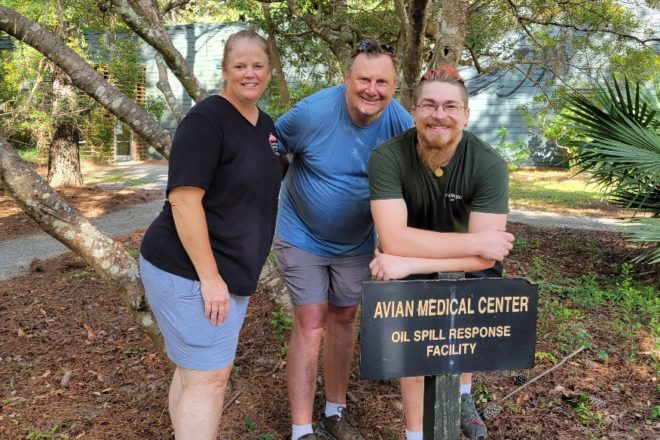
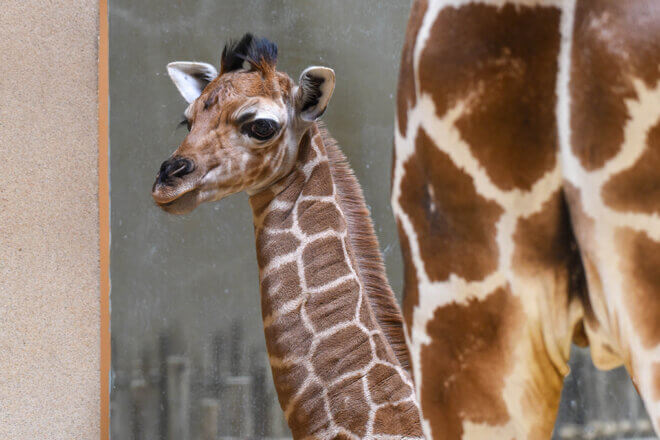
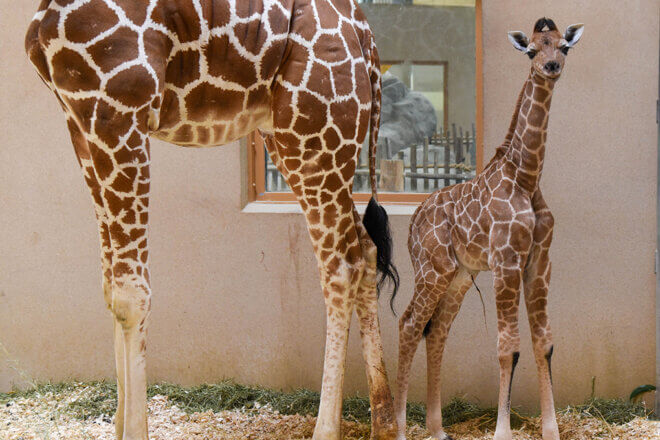
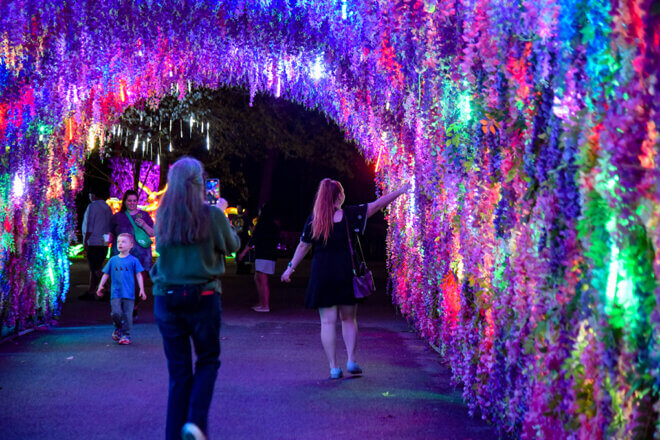
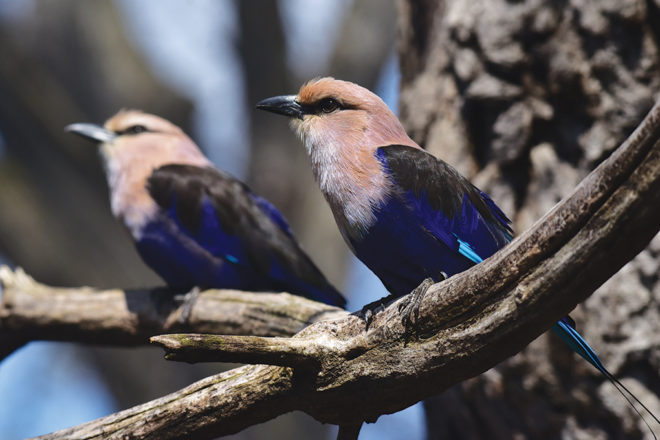
Share this article